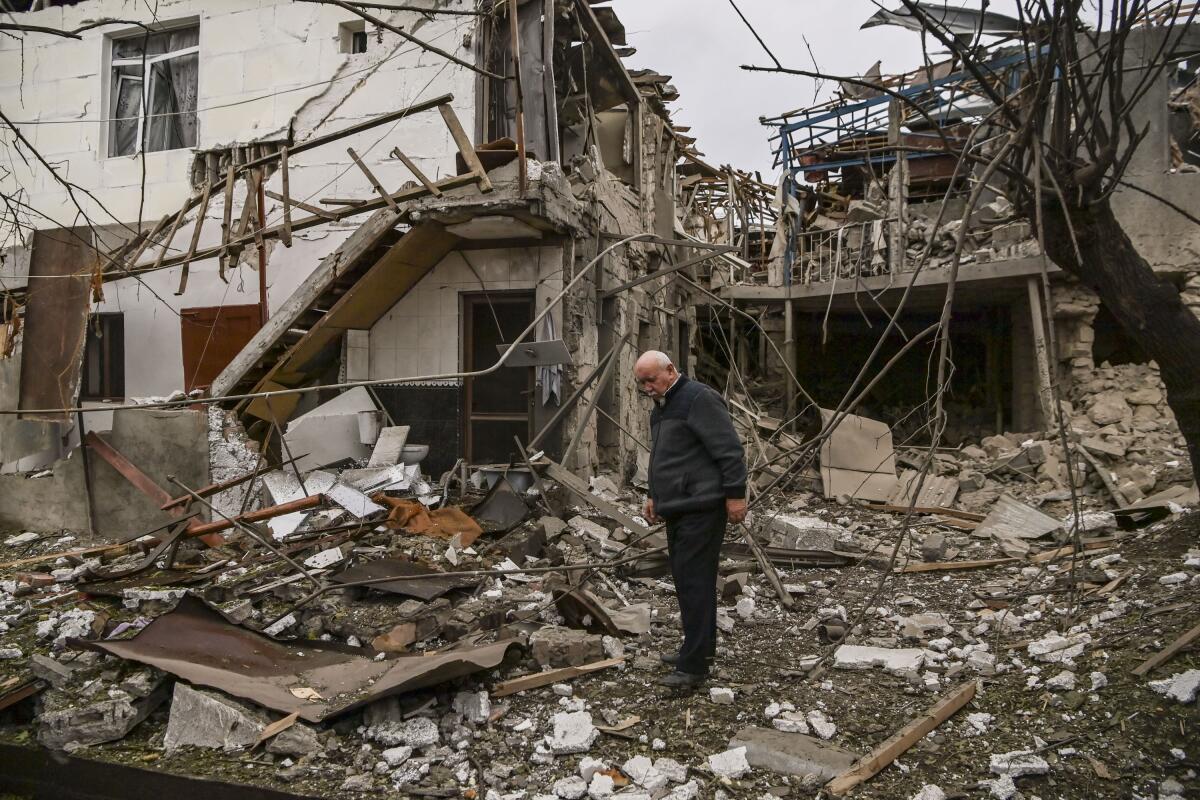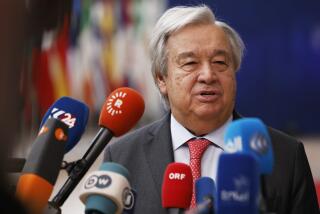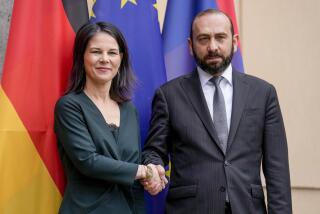As civilians bear brunt of clash over ethnic Armenian enclave, EU urges halt to hostilities

- Share via
The European Union’s top diplomat on Wednesday voiced alarm over the intensifying threat to civilians posed by the worst fighting in 25 years between Armenian and Azerbaijani forces, calling for swift negotiations to end hostilities.
Amid fears the conflict could escalate into a wider regional clash, France, the United States and Russia were due to hold talks Thursday in Geneva about the fighting that erupted Sept. 27 over the ethnic Armenian enclave of Nagorno-Karabakh, which lies inside Azerbaijan.
“We have seen extremely worrying reports of a surge in attacks on populated areas, which is taking a deadly toll on civilians,” Josep Borrell, the EU’s foreign affairs chief, told European lawmakers, calling on both sides to “fully observe their international obligations” to protect non-combatants.
“Our position is clear: the fighting must stop,” said Borrell, calling for negotiations without preconditions.
In recent days and nights, artillery fire has been raining down on Nagorno-Karabakh’s capital, Stepanakert, sending terrified residents into bomb shelters.
“Buildings and houses are destroyed — we are so afraid of it,” an inhabitant of the city, identified only by her first name, Sida, told the Associated Press. “How can one stand it?”
Fighting over the Delaware-sized territory, which Armenians call by its historic name Artsakh, is being watched with consternation not only in Armenia proper but by members of a large diaspora, many of whom live in Southern California.
They include descendants of victims and survivors of the Armenian genocide carried out by Ottoman Turks for several years beginning in 1915. The Turkish government acknowledges mass deaths but disputes use of the term “genocide,” saying killings and displacement occurred against the backdrop of chaos and fighting as the Ottoman Empire was collapsing.
The hostilities are the fiercest since an uneasy truce in 1994 ended a war that claimed about 30,000 lives in the late 1980s and the early 1990s, as the Soviet Union was breaking up and its ex-republics were forming independent states. Since that cease-fire, Nagorno-Karabakh has been self-ruled by ethnic Armenians, but the sides did not reach any negotiated settlement.
The larger South Caucasus region is a key corridor for oil and gas, and rivals Russia and Turkey have jostled for influence. Russia has ties to both Armenia and Azerbaijan, and a military base in Armenia; Turkey has come down squarely on the side of Azerbaijan, with which it shares ethnic and linguistic sides.
This week, the fighting has come closer to Azerbaijan’s oil and gas pipelines, a source of energy for Europe and a key source of revenue for the Azeris. BP, the British oil company, said it had stepped up security at its facilities in Azerbaijan.
Azerbaijan this week accused Armenia of deliberately targeting a major oil pipeline, a charge that Armenia sharply rejected.
Turkey’s foreign minister, Mevlut Cavusoglu, on Tuesday traveled to the Azeri capital of Baku in a show of support. Turkey denies Armenian allegations that it has sent militia fighters from Syria to Azerbaijan, or that it has been arming its ally.
Also part of the volatile mix surrounding the conflict is Iran, which borders both Armenia and Azerbaijan. Iranian state media quoted President Hassan Rouhani as warning in televised remarks that “we must be attentive that the war between Armenia and Azerbaijan does not become a regional war.”
Fearing a conflagration in the strategic region, French Foreign Minister Jean-Yves Le Drian on Wednesday also urged a negotiated cease-fire.
“We want everyone to understand that it is in their interest to immediately stop hostilities, without conditions,” he told French lawmakers.
Azerbaijan has demanded that Armenia withdraw from Nagorno-Karabakh, which the government in Yerevan has vowed never to do.
Azerbaijan said its foreign minister, Jeyhun Bayramov, would be in Geneva on Thursday when U.S., French and Russian representatives meet to discuss the crisis. The three nations make up the so-called Minsk Group that has mediated the conflict under the auspices of the Organization for Security and Cooperation in Europe, or OSCE.
More to Read
Sign up for Essential California
The most important California stories and recommendations in your inbox every morning.
You may occasionally receive promotional content from the Los Angeles Times.










